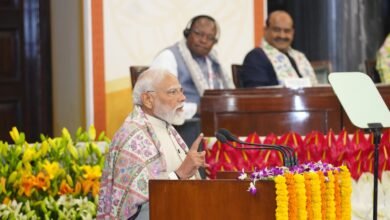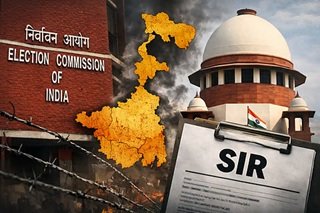Prabowo’s Indonesia and the future of India-Indonesia strategic ties
News Mania Desk / Piyal Chatterjee / 26th January 2025

Presiden Indonesia Prabowo Subianto melakukan kunjungan kenegaraan ke India pada 25-26 Januari 2025. This is his first trip to the country since he assumed office in October of the previous year, coinciding with the 75th anniversary of the bilateral relationship between India and Indonesia. In 2018, during the visit of former Indonesian President Joko Widodo (Jokowi) to India, both nations enhanced their ties to a Comprehensive Strategic Partnership. However, considerable untapped potential remains in the relationship, prompting the question of what actionable measures can be implemented to enhance the partnership in various areas. It is widely agreed that Prabowo will adopt a hands-on stance regarding foreign and defense policy and will actively participate in formulating and executing foreign policy throughout his time in office. Will this create a chance for India to enhance its partnership with Indonesia further? Could this trip open the door to enhanced bilateral relations between the two nations?
There is a consensus that Prabowo will have a hands-on approach when it comes to foreign and defence policy and will play an active role in shaping and implementing foreign policy during his tenure. Will this present an opportunity for India to further strengthen its partnership with Indonesia? Can this visit pave the way for stronger bilateral ties between the two countries?
Before taking off for his visit to India, President Prabowo had stated “India is our friend and an important partner to Indonesia. India was one of the countries that strongly supported our struggle for independence during the war until 1949.” It is expected that the two leaders will be inking several Memorandums of Understanding (MOUs) to strengthen bilateral cooperation on issues ranging from health, education, culture, security and maritime safety. President Prabowo is also being accompanied by Representatives from the Indonesian Chamber of Commerce and Industry (Kadin) on this visit so that there can be meetings with the Indian business communities who are looking to invest in Indonesia. The Indonesian Foreign Ministry (KEMLU) has described the visit to India as “an affirmation of the deepening and widening strategic cooperation between the two countries, especially in the economic, security, and maritime sectors”.
Since taking office, President Prabowo has made several decisions regarding foreign policy that indicate a significant departure from the approach adopted during the Jokowi administration. To begin with, appointing Sugiono as Foreign Minister—a loyalist from Prabowo’s party, who is referred to by some as his “ideological son”—marked a departure from tradition. Typically, experienced diplomats from the Indonesian Foreign Ministry have been chosen as Foreign Ministers historically. Para akademisi dan analis Indonesia telah menyoroti bahwa ini menunjukkan bahwa Prabowo sendiri menginginkan untuk mengambil kendali dalam menentukan langkah dan arah kebijakan luar negeri Indonesia ke depan. Many scholars and analysts view Prabowo as an “extreme nationalist and a realist who holds that a nation’s wealth and military strength support its success in a chaotic world.” In his presidential debates and later remarks, he asserted that Indonesia will be a “good neighbour”—maintaining the “many friends, zero enemies” stance. Prabowo has interpreted this motto by rephrasing it as ‘friend to everyone, foe to no one’. Prabowo’s international visits to China, the United States (US), Russia, and several ASEAN nations such as Malaysia demonstrate his eagerness to engage with various partners in Asia and Europe to strengthen Indonesia’s standings in trade, defense, security, and other fields.
Prabowo will persist in his efforts to improve Indonesia’s military strength and update the military to protect national interests. Throughout his time as Indonesia’s Defence Minister, he formalized defense agreements with nations such as Australia and Singapore. He had also traveled to India amid the pandemic to explore the potential and opportunities for enhancing defence relationships between India and Indonesia. His recent trip to Russia right after his election victory in July 2024 also indicates ‘a potential recalibration of Indonesia’s foreign policy and a desire to explore future military acquisitions and defence deals’.
Indonesia’s aspiration to be recognized as a prominent advocate for the Global South and to serve as a “bridge between developing and developed countries” accounts for its eagerness to be part of BRICS. A lot of people in Indonesia have wondered whether joining the BRICS puts Indonesia in closer alignment with China and Russia. Does this undermine Indonesia’s longstanding non-aligned position? Both President Prabowo and Foreign Minister Sugiano have stated that “Indonesia can leverage its role in BRICS to alter the trajectory of development that protects the interests of both the developed North and the Global South.” There is speculation that, to advance Indonesia’s economic growth, President Prabowo may opt to join various economic organizations to create economic opportunities and partnerships with almost all developed nations. This also clarifies Indonesia’s request to join the OECD.
India inviting President Prabowo as the Chief Guest for its Republic Day celebrations is a positive step and highlights Indonesia’s significance in India’s Act East policy. The two countries can explore various areas to strengthen this partnership further. India aims to finalize a $450 million agreement to export Russian-supported supersonic cruise missiles to Indonesia. This is expected to be talked about by the two leaders during their meeting. However, since Indonesia is working to stabilize its finances to finalize this agreement, challenges persist. India and Indonesia have been in discussions for nearly ten years regarding the sale of the BrahMos cruise missile. Another challenge that can pose a problem is Indonesia’s effort to enhance its local defense manufacturing capabilities. It has also launched an initiative named ‘Made in Indonesia’. This could pose an obstacle for upcoming defense agreements. Hence, it is essential to explore the complementaries that exist between India’s ‘Make in India’ and Indonesia’s ‘Made in Indonesia’ and how these can be utilized.
In addition to this, maritime security represents another important domain that both nations should prioritize. In 2018, the two nations formalized a collaborative vision statement for maritime partnership in the Indo-Pacific. It is time to discuss an implementation strategy or an operationalization plan for this collective vision statement and examine whether it can be converted into a collaborative action plan for maritime security in the Indo-Pacific. Considering Indonesia is located along vital sea lanes of communication such as the Strait of Malacca, Sunda, Lombok, Makassar, and Omboi Wetar Straits, the security of these sea lanes/SLOC security should emerge as a significant topic of discussion between the two nations. In this context, engaging in discussions to enhance or provide the necessary impetus for the Australia-India-Indonesia Trilateral Cooperation is equally significant.
In his first foreign policy speech early this month, Foreign Minister Sugiono stressed that “Indonesia’s diplomacy and foreign policy should be implemented in line with domestic development priorities.” He highlighted two main development priorities of the President: food security and the nationwide campaign of nutrition intervention through the free meals program. Indonesia has long wanted to implement the Free Meal Programme. In India the Mid-Day Meal Programme has been operational for the last 30 years, therefore this creates another opportunity for the two countries to work together.
Much of the foreign policy approach that is being undertaken by Indonesia under the current government aligns with India’s own foreign policy posture. India, too, being a non-aligned nation, is pursuing issue-based partnerships to fulfil its own global and domestic ambitions. India, in spite of being a part of many minilateral groupings like the Quadrilateral Security Dialogue, has still managed to keep up its strategic autonomy. This, again, is the policy line that Prabowo is looking to pursue. Both countries are a part of the Global South and are members of the G20, and now the BRICS. This presents a great opportunity for India to seek ways and explore areas that will give much-needed momentum to the India-Indonesia ties.






